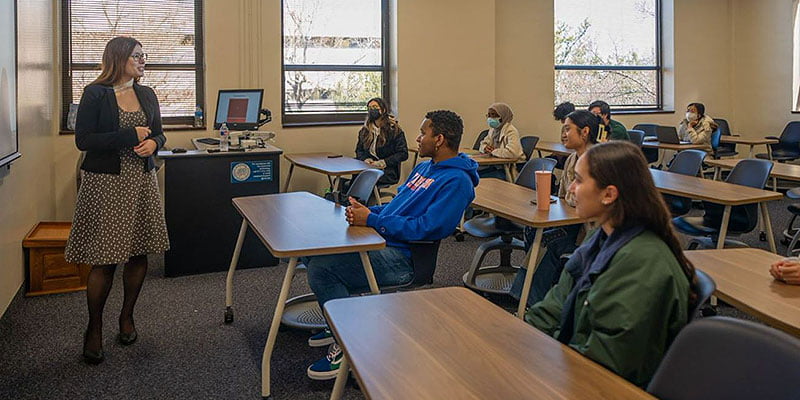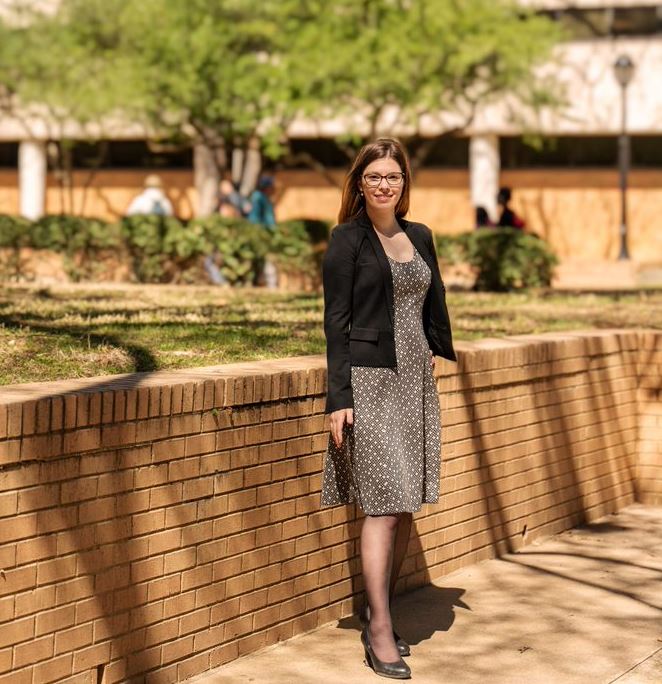At patients’ bedsides, students learn what textbooks can’t teach

What is a “good death?”
It’s one of the questions that students must consider in their biomedical ethics class taught by Eli Shupe, assistant professor of philosophy and humanities and program coordinator for the Medical Humanities and Bioethics program at The University of Texas at Arlington. The course includes a service-learning component in which UTA students volunteer with a hospice provider that delivers home health, palliative and hospice care services to sick and dying patients in Arlington.
“There is so much to look forward to with this experience, such as making connections, hearing patients’ stories and seeing what makes them light up the most,” said Megan Norris, a senior biology major who hopes to become an oncologist.
Service learning is an educational approach that combines learning objectives with community service, creating collaborations that promote civic responsibility and the advancement of a student’s educational and career goals.
In this partnership with Hospice Plus, students volunteer as companions for patients who are in their last months of life. Students do not administer medication or offer medical advice but instead provide friendly company at a patient’s bedside—having conversations, reading, creating puzzles or crafts and even just offering a hand to hold. Medical humanities students from UTA represent the largest group of volunteers at Hospice Plus, said Aneisa Chambers, volunteer coordinator at Hospice Plus.
Shupe, who also volunteers, said UTA students have responded positively to their experiences.

“Students are learning so much more by having direct interaction with patients in hospice—things you can’t teach through a textbook,” Shupe said. “They can also see first-hand how the readings and theories that we’re talking about in a philosophy classroom actually shape patient care and patient experiences in real life.”
Manar Naser Babaa, a UTA senior studying biology, said before taking Shupe’s class last fall, it never occurred to her to volunteer with hospice patients.
“I was nervous about how the experience would unfold,” Babaa said. “Now, I am grateful I got to see this side of health care. I learned how meaningful it is to simply be there for patients and offer them companionship and relief.”
For Babaa, there was a singular moment when she was able to connect her classroom lessons on autonomy to respecting a patient’s values and beliefs. The daughter of a hospice patient Babaa was visiting suggested her unresponsive mother would appreciate if Babaa read to her from a Bible.
“As a Muslim, I have never read from the Bible, but even though the patient’s beliefs were different than mine, I wanted to honor what was best for her,” Babaa said. “My eyes were definitely opened to the struggles of not only a patient, but their family and caregivers. Taking care of someone in this stage is not an easy task, but it is universal and takes a lot of strength.”
Ryan Gallagher, who is working on his second bachelor’s degree at UTA after a career as a firefighter, said the highlight of his experience was when a patient told him that they were friends.
“The point of service learning with Hospice Plus was less about helping me connect with my coursework and more about helping the patients,” Gallagher said. “Of course, the time spent helps to improve my bedside manner—but this is secondary to what it does for the other person, as the process of aging and dying can be lonely and painful.”
To help ease that loneliness, Gallagher is building a bedside ramp so the patient’s dog can join her in bed.
“In this case I made a friend, too,” Gallagher said. “I’d encourage UTA students to take the class, especially if they think they might be uncomfortable, because there is growth to be had in wading through that discomfort. You have the opportunity to really impact someone’s final days in a positive way.”